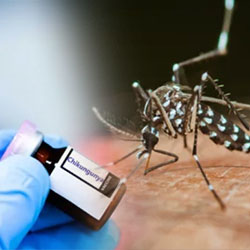By Marie Rosenthal, MS
The FDA suspended the license for the live-attenuated chikungunya vaccine (Ixchiq, Valneva) on Aug. 22, citing four new reports of serious adverse events (SAEs) consistent with chikungunya-like illness that were reported to the Vaccine Adverse Event Reporting System (VAERS).

The FDA initially approved the vaccine under the accelerated approval pathway in November 2023 to prevent disease caused by chikungunya virus (CHIKV) in people 18 years of age and older who are at increased risk for exposure to CHIKV. The FDA said its decision to suspend the company’s license was “based on serious safety concerns related to the vaccine, which appears to be causing chikungunya-like illness in vaccine recipients.”
Ixchiq labeling included a warning in the prescribing information informing that the vaccine may cause severe or prolonged chikungunya-like adverse reactions because it is a live-attenuated vaccine. “Some of the postmarketing reports include adverse events that are consistent with severe complications of chikungunya disease, resulting in hospitalization; one person died from encephalitis,” the FDA said.
In addition, the FDA said the clinical benefit of the vaccine has not yet been verified in confirmatory clinical studies. “CBER’s [the Center for Biologics Evaluation and Research’s] benefit-risk analysis broadly shows the vaccine does not have benefits outweighing risks, under most plausible scenarios. For these reasons, CBER believes this vaccine is not safe and that continued administration to the public would pose a danger to health,” the FDA said in a statement.
The “sudden decision” to suspend Ixchiq is based on updated VAERS postings, which includes four additional SAEs that occurred outside the United States, the company said. Of the four reported cases, three occurred in people ages 70 to 82 years, including one hospitalization of an 82-year-old individual who was discharged after two days; the remaining case occurred in a 55-year-old.
Valneva said, “All cases describe symptoms consistent with those previously reported during clinical trials and post marketing experience, particularly among the elderly individuals for whom the vaccine’s Prescribing Information includes warnings and precautions.
“Valneva is continuing to investigate these cases in detail and if warranted will pursue further steps in connection with FDA’s decision in accordance with applicable statutory procedures,” a company spokesperson told Infectious Disease Special Edition.
Pivotal phase 3 data for the vaccine in March 2022 showed a 98.9% seroresponse rate at 28 days with a single vaccination and final lot-to-lot consistency results in May 2022. Ixchiq-induced seroresponse was sustained over time with a 96.3% seroresponse rate six months post-vaccination (Lancet 2023;401[10394]:2138-2147).
A single dose of the vaccine “was generally safe, well tolerated, and highly immunogenic compared with placebo in healthy adults from the USA,” the researchers wrote, inducing “chikungunya virus neutralizing antibody levels predicted to be protective in almost all participants, irrespective of age. The adverse event profile of VLA1553 [the name of the vaccine candidate before approval] was similar to other licensed vaccines and equally well tolerated in younger and older adults,” the researchers wrote.
Because VAERS is a passive reporting system, a report in and of itself does not means causality. Reports are typically investigated by public health officials to confirm whether the SAE was caused by the vaccine before the FDA acts. The FDA did not respond to questions about whether such an investigation was carried out, and a representative from Valneva, who asked not to be identified, said the company was not told whether such an investigation was conducted.
On Aug. 6, the FDA removed its recommended pause in the use of the vaccine in people 60 years and older after investigating earlier reports of SAEs after Ixchiq vaccine.
The suspension means that Valneva must immediately stop shipping and selling its chikungunya vaccine in the United States.
Valneva said it will continue to engage with health authorities in all territories where Ixchiq is licensed.
“As we determine potential next steps, and as the clear threat of chikungunya continues to escalate globally, Valneva remains fully committed to maintaining access to our vaccine as a global health tool for addressing and preventing outbreaks of this devastating illness. We aim to continue providing IXCHIQ? to all countries where the product is licensed and continue our efforts with our partners to accelerate vaccine access in low-and-middle-income chikungunya-endemic countries—especially in response to any current or future chikungunya outbreaks, ensuring the vaccine reaches those most in need,” said Thomas Lingelback, Valneva’s CEO.
CHIKV is a mosquito-borne viral disease spread by the bites of infected Aedes mosquitoes, which causes fever, severe joint and muscle pain, headache, nausea, fatigue, and rash. The joint pain is often debilitating and can persist for weeks to years. In 2004, the disease began to spread quickly, causing large-scale outbreaks around the world. Since the reemergence of the virus, CHIKV has now been identified in more than 110 countries in Asia, Africa, Europe and the Americas. Between 2013 and 2023, more than 3.7 million cases were reported in the Americas, and the economic impact is considered to be significant.
The medical and economic burden is expected to grow with climate change as the mosquito vectors that transmit the disease continue to spread geographically, according to the WHO which has called chikungunya a major public health problem.
{RELATED-HORIZONTAL}